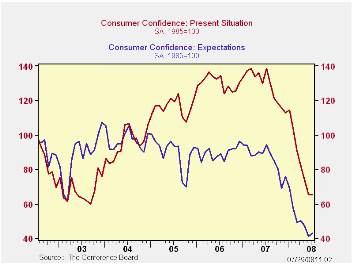 Global| Jul 29 2008
Global| Jul 29 2008Consumer Confidence Ticked Up During July
by:Tom Moeller
|in:Economy in Brief
Summary
Consumer confidence, as reported by the Conference Board, ticked up this month by 1.8% after having dropped a revised 12.2% m/m during June. The rise contrasted with Consensus expectations for a moderate decline and it was the first [...]

Consumer confidence, as reported by the Conference Board, ticked up this month by 1.8% after having dropped a revised 12.2% m/m during June. The rise contrasted with Consensus expectations for a moderate decline and it was the first monthly increase this year.
The present conditions index was roughly unchanged from June and remained near the lowest level since 2003.
A slightly improved 13.1% of respondents saw business
conditions as good but that remained near the lowest since early-2003.
Jobs as plentiful were seen by a new low, since 2003, of 13.5% while
30.3% felt that jobs were hard to get. That was the highest since
early-2004. 
The expectations component of the index ticked up 3.9% and recovered part of the prior month's 12.5% decline.
The percentage of respondents expecting business conditions to worsen in six months slipped to 32.4% and the percentage expecting income to decline was roughly unchanged at 16.0%. Just 8.2% of respondents expected more jobs while 37.1% expected fewer jobs. Only 27.7% of respondents planned to buy a major appliance within six months. That was the lowest since late last year.
Expectations for the inflation rate slipped last month to 7.6% but that was near the highest level in the series' 20 year history.
Consumer Confidence Surveys: Can They Help Us Forecast Consumer Spending in Real Time? is a 2006 article from the Federal Reserve Bank of Philadelphia. It answers "no" and it is available here.
| Conference Board (SA, 1985=100) | July | June | Y/Y % | 2007 | 2006 | 2005 |
|---|---|---|---|---|---|---|
| Consumer Confidence Index | 51.9 | 51.0 | -53.6 | 103.4 | 105.9 | 100.3 |
| Present Situation | 65.3 | 65.4 | -52.8 | 128.8 | 130.2 | 116.1 |
| Expectations | 43.0 | 41.4 | -54.4 | 86.4 | 89.7 | 89.7 |
Tom Moeller
AuthorMore in Author Profile »Prior to joining Haver Analytics in 2000, Mr. Moeller worked as the Economist at Chancellor Capital Management from 1985 to 1999. There, he developed comprehensive economic forecasts and interpreted economic data for equity and fixed income portfolio managers. Also at Chancellor, Mr. Moeller worked as an equity analyst and was responsible for researching and rating companies in the economically sensitive automobile and housing industries for investment in Chancellor’s equity portfolio. Prior to joining Chancellor, Mr. Moeller was an Economist at Citibank from 1979 to 1984. He also analyzed pricing behavior in the metals industry for the Council on Wage and Price Stability in Washington, D.C. In 1999, Mr. Moeller received the award for most accurate forecast from the Forecasters' Club of New York. From 1990 to 1992 he was President of the New York Association for Business Economists. Mr. Moeller earned an M.B.A. in Finance from Fordham University, where he graduated in 1987. He holds a Bachelor of Arts in Economics from George Washington University.
More Economy in Brief
 Global| Feb 05 2026
Global| Feb 05 2026Charts of the Week: Balanced Policy, Resilient Data and AI Narratives
by:Andrew Cates






